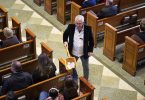
Father Alan Dietzenbach listens to Adib Kassas, acting imam at the mosque in Dubuque, Iowa, speak about Arabic calligraphy and the decoration around the arch April 26. The artwork was a gift from Catholic parishes in Dubuque to the center as a sign of friendship. (CNS photo/Dan Russo, The Witness)
by Dan Russo
DUBUQUE, Iowa (CNS) — Artist Donna Slade had never set foot in a mosque before beginning work on the intricate calligraphy in Arabic that now decorates the arch above the central point in the worship space at the Tri-State Islamic Center.
“I really enjoyed it,” Slade said of the experience. “It was great working with them.”
Slade, a member of Church of the Nativity in Dubuque, collaborated with Fayez Alasmary, a young member of the mosque, and Adib Kassas, a member of the mosque’s advisory board who serves as an imam. The trio perfected the curved lettering that expresses a verse from the Quran, the Muslim holy book.
The artwork was a gift from the Catholic parishes of Dubuque to the Islamic community. Muslims have been present in the city for years, with the first permanent worship space opening in December 2016.
“This is a gift from them expressing their welcome to us, and expressing that they are interested in building a relationship and cooperating together,” said Kassas, a physician who arrived in Dubuque from Syria about 13 years ago. “I really feel it’s a great gesture for them. Muslims have loved this gesture, accepted it and welcomed it.”
Aref Khatib, Islamic Center president, explained that the gift has a deep significance for both communities.
“It means to me bringing everyone together and realizing we should not be discriminating and we should not be judging one another. That’s God’s job, not our job,” Khatib told The Witness, newspaper of the Archdiocese of Dubuque.
“When you look at the universe, everything is different color and different shapes, just like human beings are and that’s the beauty of Allah’s creation. We should embrace the diversity,” he said.
The idea for the gift came from Father Alan Dietzenbach, parochial vicar at St. Raphael Cathedral and St. Patrick Parish.
“I’ve always been inspired by my confirmation saint, St. Francis of Assisi, who during the height of the Crusades, crossed Christian and Muslim battle lines to meet the sultan and seek to be an instrument of peace and understanding in the midst of conflict,” Father Dietzenbach said. “When we look back at the history of Christianity and Islam, we tend to focus on the times of contention and overlook all the times when these two religions coexisted and faithful Christians and Muslims worked and peacefully lived side-by-side.”
The effort grew from the relationships built by John Eby, associate professor of history at Loras College and a member of the cathedral parish, through his work with the Children of Abraham. The organization encourages dialogue among Jews, Christians and Muslims.
“This is a great example of how to love your neighbor as yourself and to show hospitality and inclusion,” Eby said. “An important concept in Islam is ‘ihsan.’ It means to beautify your actions and beautify the world. Not only is this (art) beautifying this space, it’s literally taking this action of hospitality and making it the most beautiful expression of hospitality.”
The verse painted over the archway from the Quran translates in English to read, “Oh, people. We have created you from a male and a female and made you into branches of humanity and different gatherings into nations so that you may come to know each other. Behold the most honored among you in the eye of God is the most deeply conscious of him. Truly, God is all-knowing, all-aware.”
Kassas called the Catholic community’s gift “an example and an application of this verse.”
“What this passage talks about is that we all come from one origin,” he said. “People divide themselves into groups and isolate themselves from others, thinking that they are better than them, but the truth is, God said we have made you into that kind of division to get to know one another.”
Father Dietzenbach hopes the art will serve as a lasting symbol of cooperation between the two groups.
“I hope that this gift is a sign of solidarity and love and a reminder that religious freedom is a right we hold together as we strive to make our own community a place of peace, understanding, and kinship,” he said.






